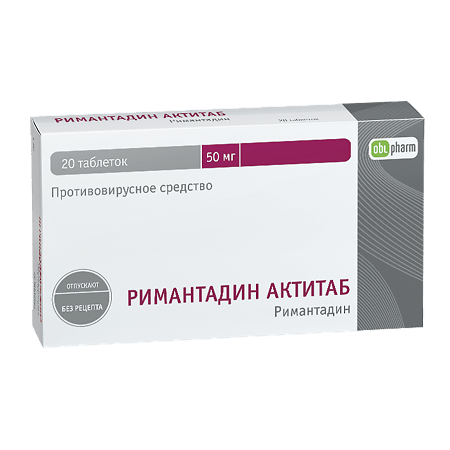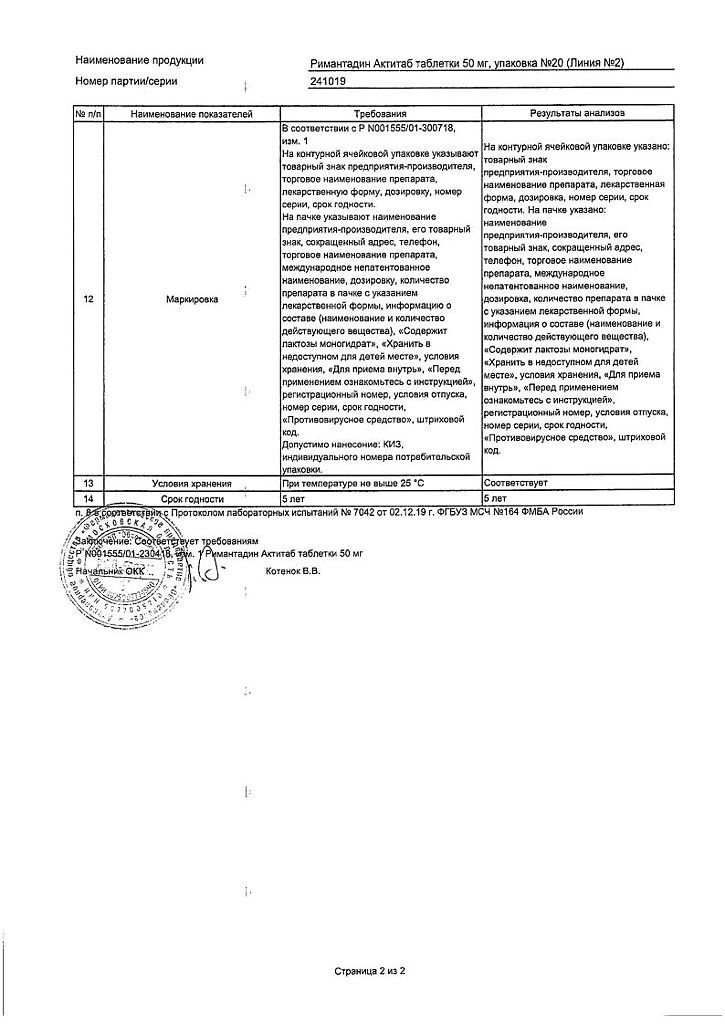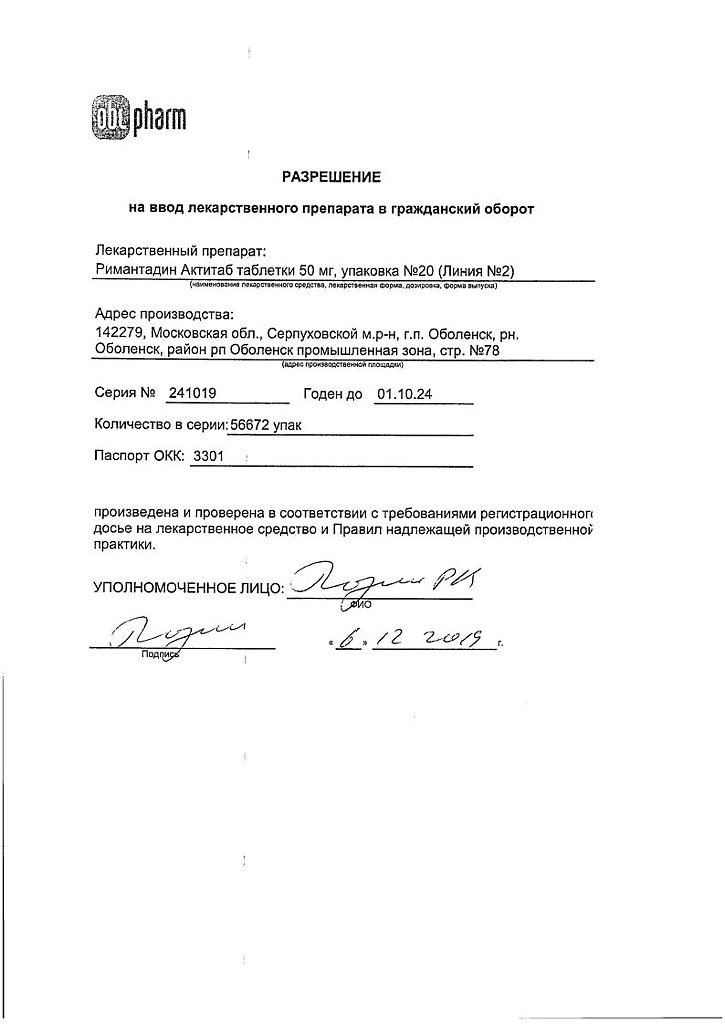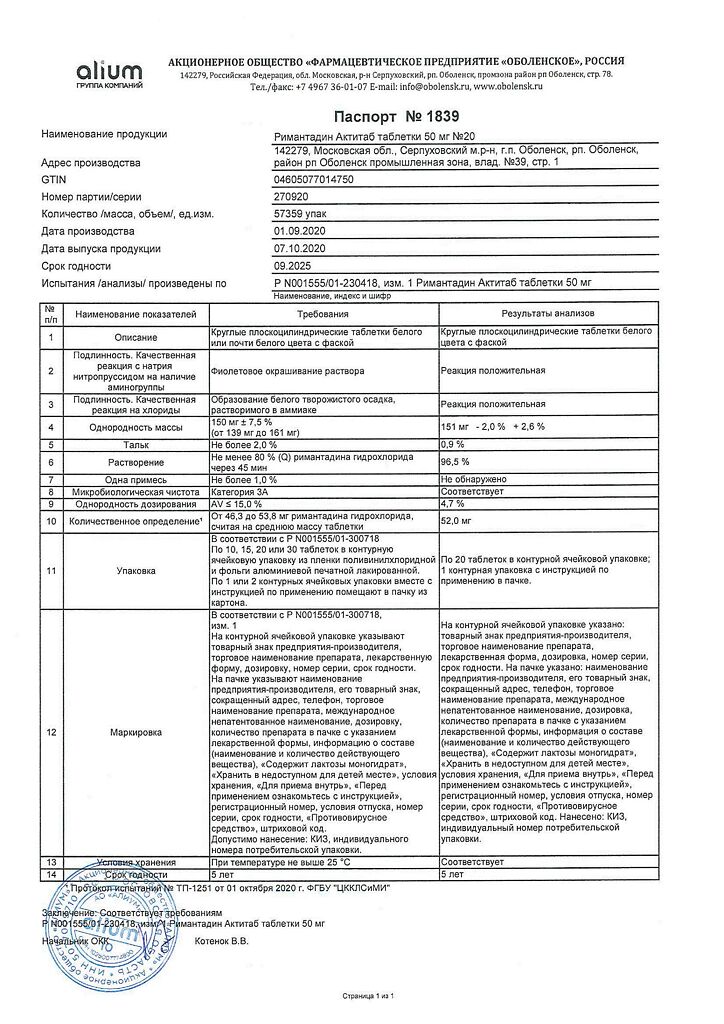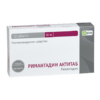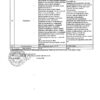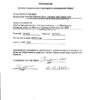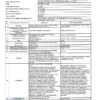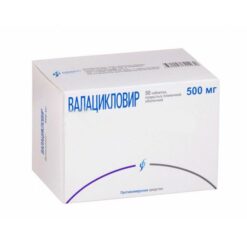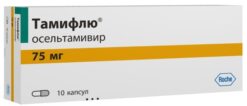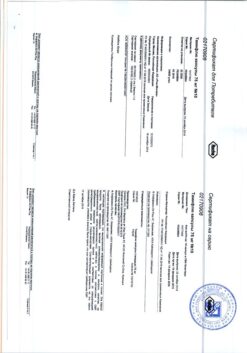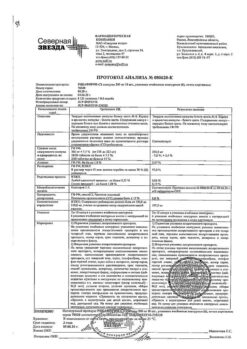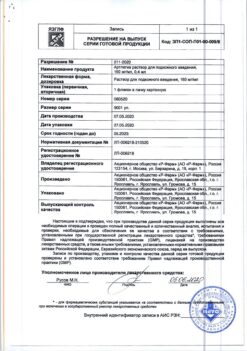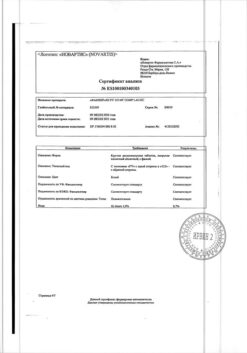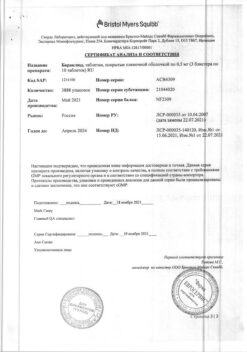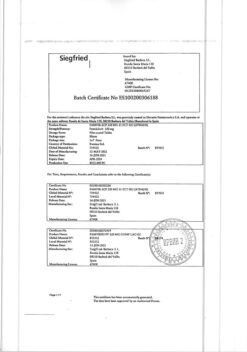No products in the cart.
Description
Pharmaceutical group:
an antiviral agent.
Pharmic action:
Rimantadine Actitab is an antiviral agent, an adamantane derivative; effective against strains of influenza A virus, Herpes simplex viruses type I and II, tick-borne encephalitis viruses (Central European and Russian spring and summer from the Arbovirus family. Flaviviridae).
It has antitoxic and immunomodulatory action. Polymeric structure provides long-term circulation of rimantadine in the body which allows to use it not only for treatment but also for preventive purposes.
As a weak base, it increases pH of endosomes having the membrane of vacuoles and surrounding viral particles after their penetration into the cell. Preventing acidification in these vacuoles blocks the fusion of the viral envelope with the endosome membrane, thus preventing the transfer of viral genetic material into the cell cytoplasm. Rimantadine also inhibits the exit of viral particles from the cell, i.e. it interrupts the transcription of the viral genome.
The prophylactic administration of rimantadine in a daily dose of 200 mg reduces the risk of influenza and also reduces the severity of flu symptoms and serological response. Some therapeutic effect may also occur when it is administered in the first 18 hours after the development of the first flu symptoms.
Pharmacokinetics:
After oral administration, it is almost completely absorbed in the intestine. Absorption is slow. Time to reach maximum concentration (TCmax) – 1-4 hours. Binding to plasma proteins is about 40%. Volume of distribution: adults – 17-25 l/kg, children – 289 l. Concentration in nasal secretion is 50% higher than in plasma.
The value of maximum concentration (Cmax) in administration of 100 mg once daily is 181 ng/ml, in 100 mg twice daily – 416 ng/ml. It is metabolized in the liver. Period of half-life (T1/2) in adults 20-44 years old – 25-30 h, in elderly patients (71-79 years old) and in patients with chronic liver failure – about 32 h, in children 4-8 years old – 13-38 h; more than 90% is excreted by kidneys during 72 hours, mainly as metabolites, 15% – unchanged.
In chronic renal insufficiency (CKD) T1/2 is increased by 2 times. In persons with renal insufficiency and in the elderly it may accumulate in toxic concentrations if the dose is not adjusted in proportion to the decrease in creatinine clearance (CK). Hemodialysis has little effect on rimantadine clearance.
Indications
Indications
Early treatment and prevention of influenza A in adults and children over 7 years of age.
Pharmacological effect
Pharmacological effect
Pharmaceutical group:
antiviral agent.
Pharmaceutical action:
Rimantadine Actitab is an antiviral agent, an adamantane derivative; effective against strains of influenza A virus, Herpes simplex viruses type I and II, tick-borne encephalitis viruses (Central European and Russian spring-summer from the group of arboviruses of the family Flaviviridae).
Has antitoxic and immunomodulatory effects. The polymer structure ensures long-term circulation of rimantadine in the body, which allows it to be used not only for therapeutic purposes, but also for prophylactic purposes.
Being a weak base, it increases the pH of endosomes that have a vacuole membrane and surround viral particles after they penetrate the cell. Preventing acidification in these vacuoles blocks the fusion of the viral envelope with the endosome membrane, thus preventing transfer of viral genetic material into the cell cytoplasm. Rimantadine also inhibits the release of viral particles from the cell, i.e., it interrupts the transcription of the viral genome.
Prophylactic administration of rimantadine in a daily dose of 200 mg reduces the risk of influenza, and also reduces the severity of influenza symptoms and serological reaction. Some therapeutic effect may also occur when administered within the first 18 hours after the development of the first symptoms of influenza.
Pharmacokinetics:
After oral administration, it is almost completely absorbed from the intestines. Absorption is slow. Time to reach maximum concentration (TCmax) – 1-4 hours. Bonding with plasma proteins is about 40%. Volume of distribution: adults – 17-25 l/kg, children – 289 l. The concentration in nasal secretions is 50% higher than the plasma concentration.
The value of the maximum concentration (Cmax) when taking 100 mg 1 time per day is 181 ng/ml, 100 mg 2 times a day is 416 ng/ml. Metabolized in the liver. The half-life (T1/2) in adults 20-44 years old is 25-30 hours, in elderly patients (71-79 years old) and in patients with chronic liver failure – about 32 hours, in children 4-8 years old – 13-38 hours; more than 90% is excreted by the kidneys within 72 hours, mainly in the form of metabolites, 15% unchanged.
In chronic renal failure (CRF), T1/2 increases by 2 times. In persons with renal insufficiency and in the elderly, toxic concentrations may accumulate if the dose is not adjusted in proportion to the decrease in creatinine clearance (CC). Hemodialysis has little effect on the clearance of rimantadine.
Special instructions
Special instructions
Compared to amantadine, it has higher clinical efficacy and is less toxic.
Viruses resistant to the drug may emerge.
For influenza caused by virus B, rimantadine has an antitoxic effect.
When using rimantadine, exacerbation of chronic concomitant diseases is possible. Elderly patients with arterial hypertension have an increased risk of developing hemorrhagic stroke. If there is a history of epilepsy and ongoing anticonvulsant therapy while using rimantadine, the risk of developing an epileptic seizure increases. In such cases, rimantadine is used at a dose of 0.1 g per day simultaneously with anticonvulsant therapy.
Prophylactic administration is effective during contacts with sick people (the drug must be taken for at least 10 days after contact), during the spread of infection in closed groups and at a high risk of developing the disease during an influenza epidemic.
During the treatment period, care must be taken when driving vehicles and engaging in other potentially hazardous activities that require increased concentration and speed of psychomotor reactions.
Active ingredient
Active ingredient
Rimantadine
Composition
Composition
Active ingredient: rimantadine hydrochloride 50 mg.
Contraindications
Contraindications
– Hypersensitivity to rimantadine.
– Acute liver diseases;
– Acute and chronic kidney diseases;
– Thyrotoxicosis;
– Pregnancy and lactation;
– Children’s age (up to 7 years);
With caution:
Arterial hypertension, epilepsy (including history), cerebral atherosclerosis, chronic renal failure, liver failure.
Side Effects
Side Effects
From the digestive system: epigastric pain, flatulence, increased bilirubin levels in the blood, dry mouth, anorexia, nausea, vomiting, gastralgia.
From the side of the central nervous system: headache, insomnia, nervousness, dizziness, impaired concentration, drowsiness, anxiety, increased excitability, fatigue.
Other: allergic reactions.
Interaction
Interaction
With simultaneous use, rimantadine reduces the effectiveness of antiepileptic drugs.
Adsorbents, astringents and coating agents reduce the absorption of rimantadine.
Agents that acidify urine (ammonium chloride, ascorbic acid) reduce the effectiveness of rimantadine (due to increased excretion by the kidneys).
Agents that alkalize urine (acetazolamide, sodium bicarbonate) enhance its effectiveness (reduced excretion by the kidneys).
Paracetamol and acetylsalicylic acid reduce the Cmax of rimantadine by 11%.
Cimetidine reduces the clearance of rimantadine by 18%.
Manufacturer
Manufacturer
Alium JSC, Russia
Additional information
| Manufacturer | Alium JSC, Russia |
|---|---|
| Medication form | pills |
| Brand | Alium JSC |
Related products
Buy Rimantadine Actitab, tablets 50 mg 20 pcs with delivery to USA, UK, Europe and over 120 other countries.

